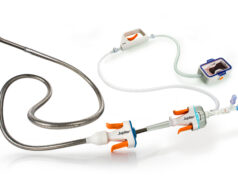 Interventional News’ most popular stories from August include a commentary on intra-arterial approaches to advanced pancreatic cancer; perspectives on 25 years of day-case IR in the UK; study results concerning high-dose dexamethasone for post-embolization syndrome in PAE; and a window into IR training in the USA offering insights into contemporary experiences within the speciality.
Interventional News’ most popular stories from August include a commentary on intra-arterial approaches to advanced pancreatic cancer; perspectives on 25 years of day-case IR in the UK; study results concerning high-dose dexamethasone for post-embolization syndrome in PAE; and a window into IR training in the USA offering insights into contemporary experiences within the speciality.
When utilised as a first-line technique for medium vessel occlusion (MeVO) stroke, aspiration and stent-retriever thrombectomy have demonstrated “no significant difference” in imaging-related or clinical outcomes. That is according to a multicentre, propensity score-matched analysis including more than 400 patients, the results of which have been published in the journal Stroke: Vascular and Interventional Neurology.
2) Alucent Biomedical granted US FDA approval for clinical study
Alucent Biomedical has announced that the US Food and Drug Administration (FDA) granted an investigational device exemption (IDE) for a US clinical study of AlucentNVS, a unique light-activated, drug-coated balloon catheter technology.
3) Intra-arterial approach to locally advanced pancreatic cancer
Ripal Gandhi provides commentary on approaches to treating hypovascular tumours and contemporary investigations in trans-arterial micro-perfusion (TAMP). Early studies of TAMP using gemcitabine chemotherapy in patients with locally advanced pancreatic cancer (LAPC), has shown the approach to be safe with no obvious local toxicity.
4) AngioDynamics completes enrolment for PRESERVE clinical study
AngioDynamics announces the completion of enrolment and final treatment in its pivotal study of the NanoKnife system for ablation of prostate tissue in an intermediate-risk patient population (PRESERVE).
5) London hospital’s positive 25-year experience offering day-case IR service
Authors from King’s College Hospital (London, UK) publish a letter in Clinical Radiology detailing their centre’s experience after 25 years of day-case interventional radiology (IR) services, advocating that the model “[enables] rapid recovery, [expediting] ambulation and [promoting] same-day discharge”.
6) New report returns to issue of improving UK’s paediatric IR provision
In 2010, the UK Royal College of Radiologists (RCR) with the Royal College of Paediatrics and Child Health (RCPCH) published a report focused on how to improve paediatric interventional radiology (PIR) services. In June 2023, an updated report was published to “identify how PIR services can be expanded and improved” and “suggest solutions” that can be enacted by commissioners, healthcare leaders and hospitals.
7) High-dose dexamethasone for post-embolization syndrome in PAE “ineffective”
Petra Svarc (Rigshospitalet, Copenhagen, Denmark) presented her group’s findings during the scientific paper session at the European Conference on Embolotherapy (ET; 21–24 June, Valencia, Spain). They found that high-dose dexamethasone is ineffective in reducing the symptoms of post-embolization syndrome in patients who have undergone prostate artery embolization (PAE).
8) WRAPSODY Arteriovenous Access Efficacy (WAVE) pivotal study completes enrolment
Merit Medical has announced that is has completed enrolment in its WRAPSODY Arteriovenous Access Efficacy (WAVE) pivotal study.
9) “The PAIRS IR curriculum […] will be published by the 2024 annual meeting”
Ayman Al Sibaie, a consultant interventional radiologist at Rashid Hospital (Dubai, UAE) speaks to Interventional News to delve into his practice in Dubai, to get his take on how interventional radiology (IR) practice varies between the Middle East-North African (MENA) region and the Western world, and his perspective on PAIRS’ work, having been president for the past four years.
10) A window into IR training in the USA
Oluwatoyin (Toyin) Dada is a current fifth-year postgraduate trainee (resident) in interventional radiology (IR) and diagnostic radiology (DR), and Ariana Mills, a first-year resident at the Icahn School of Medicine at Mount Sinai (New York City, USA) answer questions about their journeys into IR from their US perspective.









